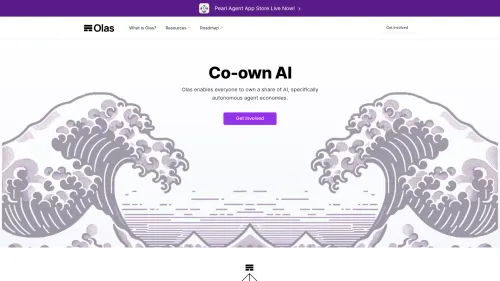Autonolas (OLAS)
Autonolas is a platform focused on developing autonomous applications for developers and decentralized autonomous organizations (DAOs). It provides a foundation for continuous operation, independent decision-making, and external interaction through its open-source software stack.
Overview
Autonolas addresses essential requirements for autonomous applications within the blockchain context, known as off-chain services. The platform offers an open-source software stack and an on-chain protocol, facilitating secure operations and incentivizing the development of autonomous applications. The Autonolas tech stack comprises four key building blocks, enabling full-stack autonomy and creating opportunities for application growth. Autonolas aims to include business logic within its software components for use in the cryptocurrency landscape.
Architecture

| Ticker | OLAS |
| Category | Artificial Intelligence (AI) |
| Website | https://olas.network |
| @autonolas | |
| Contract Addresses | |
|---|---|
| ethereum | 0x00...b0 Copied! Copied! |
| xdai | 0xce...9f Copied! Copied! |
| polygon-pos | 0xfe...95 Copied! Copied! |
| solana | Ez...yM Copied! Copied! |
Autonolas’ software framework, Open Autonomy, forms the basis for constructing agent services. These are off-chain autonomous entities operating as a multi-agent system, enhancing on-chain functionalities while primarily residing off-chain.
Multi-agent systems architecture
Autonolas employs Multi-Agent Systems (MAS) as the cornerstone for building autonomous software services. MAS involves groups of software agents operating in complex scenarios with competing incentives. The open-area framework, co-created by an Autonolas co-founder, serves as the primary means for implementing Autonolas agent services. This Python-based library enables developers to create agents that communicate peer-to-peer, interact directly with blockchains and smart contracts, and implement business logic through reusable components.
Consensus for agent services
Within the Open Autonomy framework, agent services function as multi-stakeholder systems requiring collective agreement on actions or computation outputs. Autonolas introduces state-minimized consensus gadgets to facilitate internal consensus among agents without traditional blockchains. The initial implementation uses Tendermint as a consensus engine, providing secure Byzantine fault-tolerant replication and deterministic finality.
Architecture of crypto-native agent services
Autonolas’ off-chain agent services are logically centralized yet replicated across multiple machines, leveraging a temporary blockchain created using consensus gadgets. Operators control agents and consensus gadget nodes, interconnected for fault-tolerant replication. Each agent runs an ABCI application instance, defining a finite-state machine replicated on the temporary blockchain.
On-chain protocol to anchor autonomous services
The on-chain protocol anchors Autonolas’ autonomous services on the target settlement layer, providing primitives for service creation, operation, and security. The protocol supports various roles, including developers creating agent components, service owners controlling services, operators running agent instances, and users utilizing services. It uses ERC-721 NFTs to uniquely represent agent components, canonical agents, and services.
Autonolas protocol
The Autonolas Protocol is a suite of smart contracts designed to lead, secure, and govern software code within the public blockchain. It employs the Open Autonomy framework as its primary structure for realizing autonomous services.
Deployment and components
Currently operational on the Ethereum mainnet and Görli testnet, the Autonolas Protocol includes three principal components:
- On-chain registries: Facilitates the registration of autonomous services, software agents, and agent components as on-chain NFTs.
- Tokenomics: Defines the economic framework using the OLAS token as a coordination mechanism.
- Governance: Empowers the Autonolas DAO to guide and refine the Autonolas protocol over time.
Mint packages NFTs
The Autonolas Protocol provides a web app for minting software packages as NFTs, including services, agents, and components. The process involves creating a metadata file, publishing it on a remote IPFS registry, and interacting with protocol smart contracts for on-chain minting.
Managing service life cycles
The Autonolas Protocol governs the life cycle of services through various stages, including pre-registration, active registration, finished registration, deployed, and terminated bonded, each with specific actions for service management.
Tokenomics
The Autonolas Protocol’s tokenomics employ the OLAS token for developer incentives and bonding mechanisms. The economic model attracts donations for sustainable ecosystem development.
OLAS token utilities
The OLAS token offers utilities such as governance participation, access to service whitelists, and bonding for liquidity support. The Tokenomics web app provides an interface for engaging with the economic model.
Toolkits
SMPKit
SMPKit is a toolkit for constructing services that implement investment strategies on liquidity pools. It leverages outputs from services like the APY Prediction service or external indicators.
MintKit
MintKit is a toolkit for building services with minting capabilities, such as creating NFT collections. It uses intricate logic to determine participation in mints and bid prices.
CoordinationKit
CoordinationKit facilitates the creation of services showcasing community contributions through evolving badges. It automates tracking and rewarding contributions using Ceramic streams.
MLKit
MLKit enables the construction of services with custom machine-learning capabilities, such as the ML APY Prediction Oracle, which predicts liquidity pool yields.
OracleKit
OracleKit is designed for services providing data streams onto the blockchain. The Price Oracle estimates Bitcoin prices based on various sources and secures the service through a multisig contract.
IEKit
The Impact Evaluator Kit (IEKit) is an advanced version of CoordinationKit, automating tracking and rewarding user contributions. It is adaptable for various custom impact evaluators.
GovKit
GovKit is a toolkit for building autonomous, AI-powered delegates that vote on on-chain governance proposals across Ethereum and Solana networks and off-chain on Snapshot.
MechKit
MechKit enables the creation of AI Mechs and services on the Gnosis chain, allowing users to post AI task requests on-chain and receive results efficiently.
KeeperKit
KeeperKit constructs agent services that execute smart contract functionalities in a reliable, trustless, and cost-efficient manner, allowing for complex computations.
MessagingKit
MessagingKit serves as a toolkit for building agent-messaging services based on the Open Agent Communication Network.
